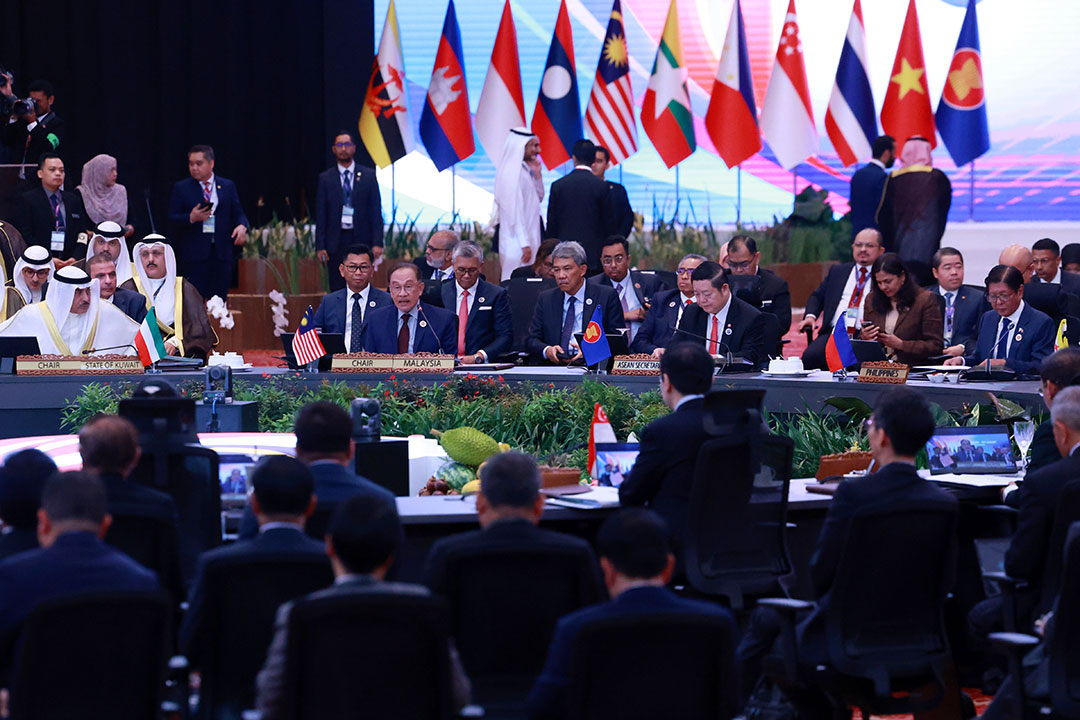Marcos seeks closer ties between ASEAN, Gulf states in digital trade

By Chloe Mari A. Hufana, Reporter
PHILIPPINE President Ferdinand R. Marcos, Jr., on Tuesday urged closer cooperation between the Association of Southeast Asian Nations (ASEAN) and Gulf Cooperation Council (GCC) in digital trade, halal market integration, and climate finance, as the two regions seek to deepen ties amid mounting global instability and economic uncertainty.
Speaking as ASEAN-GCC country coordinator on the second day of the 46th ASEAN Summit in Kuala Lumpur, Mr. Marcos underscored the need to move beyond traditional trade, proposing new linkages in areas such as the digital economy, e-commerce and sustainable development.
He cited the ASEAN Digital Economy Framework Agreement as a platform for deepening collaboration with Gulf states on interoperable standards, financial and emerging technologies.
Mr. Marcos said there is a pressing need to diversify trade ties, which he said remained overly concentrated in certain sectors.
“Our current trade patterns remain limited in scope,” he said. “To unlock the full promise of our partnership, we must go beyond traditional trade and leverage our complementary strengths.”
He said the two regions should use ASEAN’s booming digital economy and young, tech-savvy population while capitalizing on the GCC’s investment capital, energy assets and logistics infrastructure.
He also sought the creation of a mutually recognized halal certification regime to build a trusted halal value chain between ASEAN and the GCC.
“This will reduce regulatory friction and create a powerful export platform for our MSMEs and agri-food producers,” he said.
Mr. Marcos used the forum to push greater contributions to the Fund for Responding to Loss and Damage (FRLD), which the Philippines now hosts, describing it as a crucial financing mechanism for vulnerable nations facing rising sea levels, desertification and biodiversity loss.
“The Philippines’ hosting of the FRLD will accelerate the unhindered access of developing nations to climate finance,” he said.
Labor mobility remains a major pillar of ASEAN-GCC ties, Mr. Marcos said, citing more than 2.7 million ASEAN citizens, over 2 million of whom are Filipino, working across Gulf countries. He cited the need for continued upskilling and labor protection measures, noting their contributions to both host and home economies.
As the Philippines prepares to head ASEAN in 2026, Mr. Marcos pledged to strengthen global partnerships, including with the GCC.
He reaffirmed the country’s bid for a nonpermanent seat at the United Nations Security Council for the 2027-2028 term, citing peace-building successes in the Bangsamoro Autonomous Region in Muslim Mindanao as a model that could help international peace efforts.
BIMP-EAGA TIES
Meanwhile, in a separate speech to the 16th Brunei Darussalam-Indonesia-Malaysia-Philippines East ASEAN Summit Growth Area (BIMP-EAGA), Mr. Marcos called for deeper economic integration and innovation-driven collaboration among Southeast Asian subregional partners, highlighting progress made under the bloc’s Vision 2025 roadmap.
He emphasized business gains since 2017, crediting the regional pact’s strategic initiatives in trade facilitation, cross-border infrastructure and green development to improve economic outcomes in less developed areas of the region.
“Since 2017, our cooperation has deepened, and our partnerships have delivered tangible benefits for our peoples,” he said. “We have laid down stronger foundations for inclusive, sustainable and innovation-driven growth.”
The BIMP-EAGA, established in 1994, is a subregional cooperation initiative targeting underdeveloped yet resource-rich areas across the four participating nations. The bloc seeks to close economic gaps through infrastructure investments, cross-border trade and ecotourism promotion.
He noted the successful joint initiatives that have advanced the region’s development goals, particularly in logistics, energy interconnectivity and green infrastructure.
Investments in connectivity, including port and airport upgrades, digital infrastructure and power interconnections have helped facilitate greater movement of goods and people.
Mr. Marcos cited significant strides in food and energy security, ecotourism and green investments, areas seen as key to positioning BIMP-EAGA as a resilient growth corridor amid global uncertainties.
ASEAN’s collective gross domestic product (GDP) stood at $3.8 trillion in 2023, according to the ASEAN annual report. The region ranks as the third-largest trading bloc globally, with total trade reaching $3.5 trillion.
On the sidelines of the 46th ASEAN Summit, the Philippines and Thailand reaffirmed their commitment to deepen economic ties, focusing on strategic sectors such as agriculture, electronics, artificial intelligence and precious metals.
Mr. Marcos also met with Cambodian Prime Minister Hun Manet on the sidelines of the summit, where they reaffirmed their commitment to bolstering bilateral relations.
Mr. Marcos cited an uptick in trade between the two nations since 2023, citing increased Philippine automobile exports to Cambodia as a key growth driver. “I hope that we can move forward with those discussions in terms of trade, defense and potential defense cooperation.”
Hun Manet, who made an official visit to Manila in February, urged ASEAN economies to capitalize on complementarities in supply chains and diversify in the face of global trade disruptions. “There are thousands of products where we can find complementarities,” he added.
Mr. Marcos met with Thai Prime Minister Paetongtarn Shinawatra on the first day of the summit on Monday, with both leaders committing to harnessing innovation and economic complementarity to drive inclusive and sustainable regional growth.
The President welcomed the interest of a leading Thai agricultural company to invest in the Philippines, citing the vital role of public-private partnerships in accelerating national development.
He noted the “great potential” for collaboration in electronics, artificial intelligence, copper, vehicle wiring and precious metals, noting that a stronger trade relationship would help balance the trade ledger with Thailand, which was the Philippines’ sixth-largest trading partner last year.
“I really see that there is great potential in all of these areas,” Mr. Marcos said as the Philippines targets to increase its exports to Thailand for a more balanced trade.
Ms. Shinawatra, for her part, welcomed the opportunity to expand agricultural cooperation, highlighting Thailand’s strong investments in research and development.



